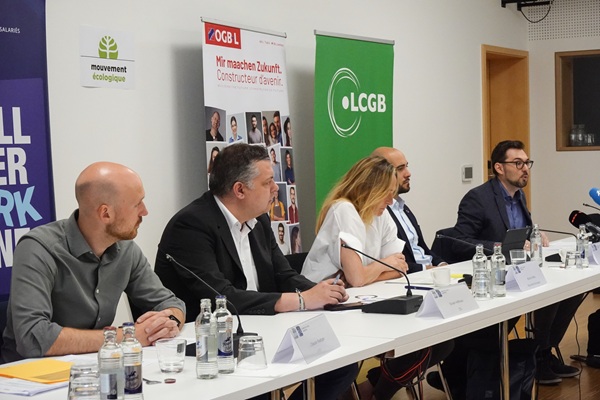 the CSL press conference on 5 June 2025;
Credit: CSL
the CSL press conference on 5 June 2025;
Credit: CSL
On Thursday 5 June 2025, the Chambre des Salariés (CSL) held a press conference in Luxembourg-Bonnevoie, together with the OGBL, the LCGB and the Mouvement écologique (Ecological Movement), at which they presented their joint position in the framework of the development of the Luxembourg Social Climate Plan (PSC) in a 21-page signed statement.
The signatories have called for a socio-ecological transition that protects vulnerable households, guarantees access to energy and mobility for all, and ensures a fair distribution of efforts.
Making the socio-ecological transformation a political priority
The four signatories explained that the socio-ecological transformation, one of the greatest challenges of our time, has unfortunately not yet been a political priority in Luxembourg.
According to them, the central shortcoming of Luxembourg's energy and climate policy, also from a social perspective, can be summarised as follows:
• In practice, existing support measures often bypass people with low incomes – be it due to a lack of equity, tenancy agreements or structural restrictions.
• At the same time, there is a lack of targeted, low-threshold programmes that systematically and effectively support these households.
Low-income people in particular are not among the main perpetrators of the environmental and climate crisis – on the contrary – they suffer particularly from the climate and biodiversity crisis. According to calculations by STATEC on household purchasing power and energy precariousness, energy expenditure accounts for a significantly higher share of the budget of these low-income households.
This results in a clear political mandate: Policymakers must make decisions today that specifically hold those sections of the population who contribute disproportionately to the climate crisis accountable. Clear guidelines, regulations and limits are essential here.
Climate protection, however, must not lead to social division, but rather be used as an opportunity for greater justice.
With a new impetus, the EU has already taken an important step toward a socially just energy transformation: All member states are called upon to develop a "Social Plan for the Climate" (PSC) by 2025. A first draft of the "Social Plan for the Climate" was presented in Luxembourg from March 25 to April 30 as part of a public consultation process.
The Chamber of Labor (CSL), OGBL, LCGB, and Mouvement Ecologique seized this opportunity and issued a joint 21-page statement. Together, they firmly believe that ecological and social justice are inextricably linked. The current government must make significantly greater efforts to advance a socially just climate policy. The PSC is a key building block for the rapid development of a comprehensive national strategy for socio-ecological transformation.
CSL, OGBL, LCGB, and Mouvement Ecologique present concrete and key suggestions for improvement – with a view to both the PSC itself and a more far-reaching climate-social strategy:
• Sufficient financial resources must be made available for the socio-ecological transition,
far beyond those specified by the EU.
• The creation of a PSC must be based on facts: The current situation of households must be analyzed and target groups defined. Which households are already affected by the transition and to what extent? Under what conditions do they live (e.g., insulation of their homes, share of energy costs in income)? Which households and how many people should be able to benefit from the programs? What contribution should be made to reducing CO₂ emissions? Such scenarios and calculations must form the basis for prioritizing and ranking the measures. To develop a comprehensive strategy, the stakeholders involved – especially social service providers and STATEC – should jointly define which additional data are required for a rapid, fact-based analysis.
• The climate social plan should be part of an overall strategy for socio-ecological transition and meet the following criteria:
o a clear hierarchy of measures;
o an evaluation of the effectiveness of existing instruments so that barriers to implementation can be identified and addressed;
o a clear prioritization of the most important measures.
It remains essential to effectively mitigate the highly regressive effects of environmentally-related taxation through targeted social compensation measures. The goal must be to mitigate the impacts on particularly vulnerable households and protect them from energy poverty. Only in this way can a fair, socially acceptable and ecological transition be enabled.
The CO2 tax credit must therefore be strengthened until the fiscal revenue shortfall from these compensation payments corresponds to at least 50% of the CO₂ tax revenue.
In view of the numerous recent European changes that suggest further increases in the CO2 price per ton, CSL, OGBL, LCGB, and Mouvement Ecologique are also calling on the government to conduct a comprehensive analysis of the regressive effects of these price developments on the purchasing power of vulnerable households.








